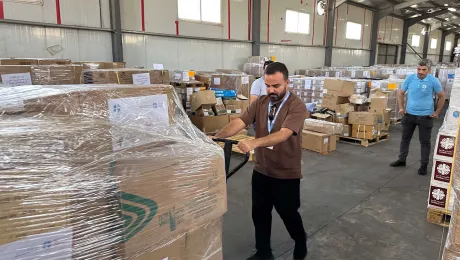
Elected deacons and officers at Augustdorf in the British zone, west Germany. Photo: LWF Archives
Encouragement from LWF’s history with Latvian refugees
(LWI) - Support and advocacy for refugees has been a central vocation of The Lutheran World Federation (LWF) since its founding nearly 70 years ago.
Millions of Europeans were displaced during and after the Second World War. Some estimates put the number of refugees from Europe at nearly 60 million. Around 10 million of these were Lutheran Christians. Immediately after the end of the war, Lutherans around the world mobilized to provide assistance. This was the context in which LWF was founded in 1947.
The first assembly of the LWF in Lund, Sweden, in 1947 called attention to the situation of refugees and encouraged the churches to respond to this need in any way possible. Since then, support to refugees is one of the foundational principles of the LWF.
This has entailed meeting the basic needs of displaced people, assisting with resettlement, advocating for their rights and supporting the churches in their ministry to people living in exile. One such church was the Latvian Evangelical Lutheran Church in Exile.
Pastors, hymnbooks and worship spaces
More than 200,000 Latvians fled their home country as the war was ending. They were ultimately resettled elsewhere. The 125,000 members of the church who moved to Germany’s western region and to Austria were supported by 110 pastors. The LWF assisted the church and others in similar situations by helping pastors secure travel permits, establishing worship spaces, supplying Holy Communion sets and paper to print hymnbooks.
A number of letters and documents in the LWF archives give insight into the situation of refugees and church life in the years after the war and affirm the reasons why intervention by the LWF was important. LWF archivist, Béatrice Bengtsson, was moved by a response to a request from a pastor of the Latvian church. One reads that support would be provided for printing Bibles and hymnbooks, and that communion sets would be ordered. An excerpt:
"Pastor “X” has asked for clerical gowns for about 20 pastors. We acknowledge that decent gowns are desirable, but we must consider that millions of people who ask for Church Inter Aid, have no clothing at all. So we felt that we should postpone this demand."
The priorities were clear: The naked need to be clothed (Mt 25).
One “Latvian cross” returns to the Communion Office
As a token of gratitude for LWF efforts to resettle Latvian refugees, ordained LWF leaders were later presented with crosses. A cross originally presented to Dr Carl Lund-Quist, LWF General Secretary 1951-1960, was recently returned to Geneva. Lutheran pastor Ron Swenson who handed it over to General Secretary Rev. Dr Martin Junge explained that he had received it from Lund-Quist's sister in the 1980s.
Junge accepted the cross on behalf of the LWF, and said on the occasion:
"To receive the “Latvian cross” was an amazing encouragement. We were reminded that serving those in need is one of the foundational vocations of the LWF. The “Latvian cross” encourages us to sustain this vocation in today’s world with its unprecedented movement of refugees worldwide. Most importantly, it reminds us that then and now people continue seeking protection while fleeing war and violence. And that churches have a lot to contribute in this regard.
"The LWF as communion of churches continues standing firmly behind the principle that there is a duty to protect refugees, irrespective of nationality, religious affiliation and any other consideration. What applied then, while protecting and resettling Latvians, applies today, while protecting and resettling Syrians and all other people fleeing from violence.”
We were reminded that serving those in need is one of the foundational vocations of the LWF. The “Latvian cross” encourages us to sustain this vocation in today’s world with its unprecedented movement of refugees worldwide. Most importantly, it reminds us that then and now people continue seeking protection while fleeing war and violence. And that churches have a lot to contribute in this regard.

Services were held regularly in the camp parishes, often in churches like this in Camp Valka at Nurnberg.

The Latvian children of Valka Camp at Nurnberg attended their children's service each Sunday.

Over 100 pastors of the Latvian Evangelical Lutheran Church in Exile met at the Lutheran Study Center at Berchtesgaden in October 1948.

The huge Latvian congregation in exile at Esslingen followed the procession of confirmands led by Archbishop Teodors Grunbergs.

Hymn singing was a vital part of the liturgy in the churches.

The ladies' double quartet of the Augustdorf camp congregation participated in the worship services.

Congregations in exile regularly elected deacons and officers, such as this group of leaders at Augustdorf in the British zone, west Germany. In the center is Pastor Edgard Kiploks, beside him (second row, right) are Dean J. Ozols and the church organist.
Photos: LWF Archives

A Latvian Cross presented to Dr Carl Lund-Quist, LWF General Secretary 1951-1960, as a token of gratitude for LWF efforts to resettle Latvian refugees. The cross, recently returned to the LWF Communion Office, served as a reminder to our duty to protect refugees, regardless of nationality or religious affiliation, Rev Dr. Martin Junge said. Photo: LWF/S. Gallay


